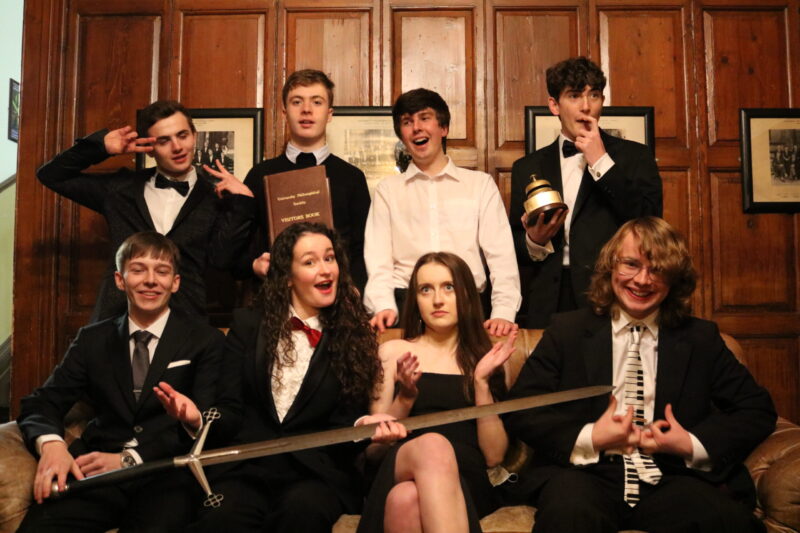Yesterday evening, shielded by the Graduate Memorial Building (GMB) from the November elements, Registrar of the University Philosophical Society (the Phil) Peter O’Brien welcomed steadily thawing attendees to the Eamon O’Coinne Memorial Maidens Final 2021. Clad in the slip dress which he had daringly stripped mid-commentary to, immediately diffusing a sense of ease about the room, O’Brien wore his heart on his sleeve as he recollected the courage he had to bear “coming out as a short king” on the post-Zoom debating scene. All the while, thoughts undoubtedly swirled in the minds of those participating in the debate, sitting quietly preparing themselves to sway our opinions on the epigrammatic Oscar Wilde-inspired motion: ‘There is only one thing in the world worse than being talked about, and that is not being talked about.’
The first speaker on the proposition’s side, Lou Lou McHale, (spoiler) ultimately reigned victorious. She weaved her views on the importance of human perception seamlessly into her commentary, referencing the recently restored lipstick-covered tomb of Oscar Wilde and her own great-grandmother’s jewel-smuggling stories. McHale emphatically reminded us that Wilde “may be dead but he is nowhere near gone because here we are still talking about him”.
Shocking the crowd with a reference to the death of Princess Diana, Jonathon Kelly, the first speaker on side opposition, wasted no time in garnering his audience’s attention. The historical moment was used as an example of one of the most catastrophic consequences of gossip. “Fame brings misery. It brings torment.” Kelly stressed the distaste of such chatter in our lives, as something that “gets into your mind (and prevents the ability to) think properly”.
Also referencing famous figures in their introduction was proposition’s second speaker Ámhra Carey, reminding us of Kanye’s wise words: “Everybody gon’ say something. I’d be worried if they said nothing.” Attributing human happiness to wide social networks and the subsequent eventuality of being talked about, Carey prompted us to recognise that “one of our most basic desires” is doing “something that is greater than ourselves”.
A hectic array of props demanded the audience’s eyes as an air of infectious enthusiasm descended upon the podium following Kurt Scott’s arrival. Following a charming self-imposed countdown, Scott, of the opposition, questioned our morality as humans in valuing attention “independent of good or bad” and calls to mind some ruinous developments of said attention, namely bullying in schools and sexism in the workplace.
Donncha Murphy, the third to speak on the proposition’s side, infused humour into his argument. Referencing Wilde’s quote in the motion, he jested: “If you think he’s wrong, he’s probably just smarter than you.”
Siofra O’Reilly, still glowing from her victory at the College Historical Society’s (the Hist) Rosaleen Mills Maidens Competition last week, began by announcing her hope to surpass all prior speeches “under the power of bullying”. O’Reilly balanced such jest with ease by putting the very serious topic of mental illness at the forefront of her discourse, attributing nasty gossip to its foundation and condemning being talked about as a poisonous element of the human condition.
The final speaker from the proposition, Pierce Comerford, highlighted the eroded sense of self that develops when one is not talked about, whereby the person in question is not deemed justly important or interesting. Comerford concluded the proposition’s airtime with a simple yet provocative question: “If you can’t talk about yourself and you can’t talk about other people, what can you talk about?”
In the final enriching address, Conall Ó Briain began with rebuttal in reference to the proposition’s citations of great artists throughout history, listing their counterparts, Van Gogh, Kafka and, himself, namely, who had each been forgotten in their lifetimes, proving the team’s neglect of fact in this respect. Ó Briain ultimately encouraged the embrace of anonymity in explaining how the “essence of personhood” can only be fulfilled with adequate authenticity far from the draining need to be validated.
Judges were dismissed to adjudicate while attendees were ushered to Doyle’s. The chamber sat idle once more, the promise of impending uproarious laughter and furrowed brows alike a gift to Trinity students in a post-pandemic world.







